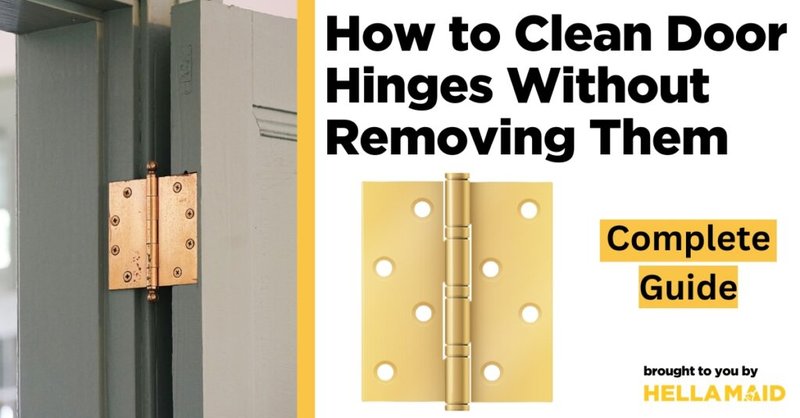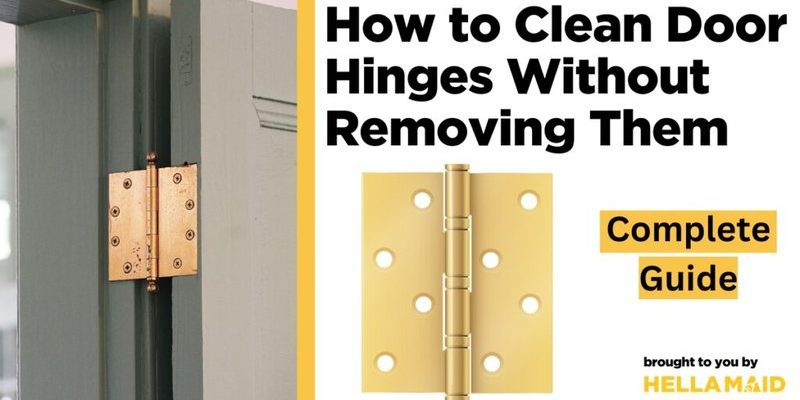
Honestly, lubricating exterior door hinges is one of those small fixes that feels intimidating until you try it. Whether you’ve got a sturdy steel front door or a classic wooden side door, the process is almost the same. And you don’t need fancy skills—or a big toolbox. With a few simple tools and the right type of lubricant, you’ll quiet those hinges and keep your door swinging smoothly, rain or shine.
Why Door Hinges Need Lubrication
Let me explain why door hinges get so noisy or hard to move in the first place. Hinges are simple mechanical parts, but they do a lot of work. Every time you open or close your door, those metal pieces grind against each other. Over time, dust, dirt, and moisture can sneak inside, making things dry and gritty. Think of it like trying to pedal a bike with a rusty chain—it’ll still go, but it’s far from smooth.
If you ignore squeaky or sticky hinges, things won’t just stay annoying. The grinding can make the metal wear down or even start to rust. In wet or humid climates, outdoor hinges take even more of a beating. That’s why a quick, regular touch-up with lubricant can make a huge difference—not just for your ears, but for your door’s health.
You might be wondering if you really need a special spray, or if something from your kitchen could work in a pinch. I’ll walk you through the best options in just a bit. For now, know this: a well-lubricated hinge helps your door close tightly, stops drafts, and makes your entryways feel solid and secure.
Choosing the Right Lubricant for Exterior Door Hinges
Not all lubricants are created equal—especially when you’re dealing with exterior door hinges. You want something that’ll last outdoors, resist water, and not attract dust. Here’s where brands matter a bit. WD-40 is the name everyone knows, but it’s better as a cleaner than a long-lasting lubricant. For actual hinge lubrication, silicone spray, white lithium grease, or a product like 3-in-One Lock Dry Lube usually work best.
Here’s a quick breakdown of your main options:
- Silicone spray—Stays slick, repels water, and doesn’t collect dust. Perfect for outdoor use.
- White lithium grease—Thicker and long-lasting; great for heavy doors or old hinges.
- Dry Teflon spray—Leaves a protective film that keeps things moving, even if it rains.
Avoid cooking oils or graphite powder for exterior hinges. Cooking oils go rancid and attract bugs, while graphite powders tend to work better inside locks than on exposed hardware. If you have a popular brand of hinge or specific type of door (like Andersen, Pella, or Schlage), their guidance usually matches these general rules.
Tools and Materials You’ll Need
Before you dive in, gather your supplies. You don’t need much—this isn’t a weekend project, more like a 10-minute fix. Here’s what most people use:
- Lubricant (silicone spray, white lithium grease, etc.)
- Paper towels or rags to catch drips
- Small straw or nozzle (usually comes attached to spray cans)
- Old toothbrush or small paintbrush for cleaning out gunk
- Flathead screwdriver if you want to loosen the hinge pin slightly (optional, but helpful)
If you’ve got an older door, grab a drop cloth or more towels. Some lubes can drip or spray wider than you’d like.
Don’t skip the cleaning step—if your hinges are packed with dirt or old, sticky grease, you’ll just be greasing the mess. It only takes a minute to wipe them down.
How To Lubricate Exterior Door Hinges Without Removing The Door
So, you’re ready to quiet those squeaks and keep your door moving like new—all without removing anything. Here’s how to do it, step by step:
- Clean the hinges. Open and close the door a few times to spot which hinge is making the most noise. Wipe down the hinges with a dry cloth to remove dust and loose dirt. If there’s lots of grime, use a bit of soapy water, then dry thoroughly.
- Target the hinge pin. Most squeaking comes from the pin inside the hinge. If yours has an exposed pin cap, gently tap it upward with a screwdriver—just enough to expose a small gap, not to remove it. This lets lubricant get right where it matters.
- Apply the lubricant. Attach the tiny straw or nozzle if your spray has one. Aim right at the hinge pin and spray a short burst of lubricant. If you can’t lift the pin, spray along the top and side of the hinge instead—a little goes a long way. Let gravity help pull the lube into the hinge.
- Move the door. Open and close the door several times. This helps the lubricant coat every surface inside the hinge. You might hear the squeak fade away as you work it in.
- Wipe away excess. Use a paper towel or rag to catch any drips or runoff. Extra lubricant can attract dirt or look messy—so keep things tidy.
If the noise lingers, don’t be afraid to spray a second time. Really stubborn hinges might need an overnight soak, but you’ll almost always notice a big improvement right away. And best of all, your door stays right where it is—no heavy lifting, no hassle.
Addressing Common Problems and Troubleshooting
Sometimes, even after you lubricate the hinges, you might run into stubborn creaks or sticking. Here’s what I recommend if things aren’t instantly perfect.
First, check for visible rust or peeling paint around the hinge. Surface rust can block lubricant, and old paint drips can glue a hinge shut. Gently scrub the hinge area with a toothbrush or use fine steel wool if you have rust. Don’t go overboard—just enough to clear the way for the spray.
If you notice the hinge is bent or the screws are loose, even the best lubricant won’t solve your problem. Tighten up the screws with a screwdriver, and check that the hinge sits flush against the door and the frame. A misaligned hinge can make the door sag or scrape, even if it’s perfectly greased.
You might be wondering if your lubricant is the issue—sometimes, a low-quality spray just doesn’t cut it. If you used WD-40 and things still sound rough, try a proper silicone spray or lithium grease. These products really do work better for long-term hinge lubrication, especially outdoors.
Some creaks and pops are signs of a bigger door issue, like settling foundations or frame damage. If the hinge keeps binding after you’ve cleaned and lubricated it, don’t be afraid to call in a handyman for a closer look.
Comparing Quick Fixes and Long-Term Solutions
Let’s talk about shortcuts versus proper fixes. Every so often, I see people spraying whatever they have on hand—olive oil, cooking spray, or even leftover bike chain lube—just to stop a squeak. Sure, you might get lucky for a day or two, but these “kitchen fixes” don’t hold up. Food oils go sticky and attract grime, making things worse in the long run.
For a truly quiet, smooth exterior door, use a lubricant that’s designed to hold up outside. Silicone sprays are the go-to for a reason: they last, repel water, and keep things from getting gunky. If you live somewhere really rainy or by the beach, a thicker option like white lithium grease is worth considering. It creates a layer that keeps salt and moisture away.
Here’s an easy comparison:
| Quick fix | Cooking spray, olive oil, WD-40 | Works briefly, attracts dust/grime, not weatherproof |
| Long-term solution | Silicone spray, lithium grease, dry Teflon lube | Lasts months, repels moisture, keeps hinges healthy |
If you’ve got unique hinges—like those on storm doors or doors with built-in closers—check your manufacturer’s website. Some use special coatings or recommend certain lubricants for warranty reasons.
How Often Should You Lubricate Exterior Door Hinges?
You might wonder if this is a once-and-done chore or something you need to keep up with. In reality, it depends on your climate and how often the door gets used.
As a rule of thumb, lubricate exterior door hinges once or twice a year, or any time you notice noise or sticking. In wet, humid areas, you may want to bump that up to every few months. A quick spritz in late fall can also prevent hinges from seizing up in freezing winter weather.
If the door gets heavy use—like the main entrance to a busy home or an apartment building—it doesn’t hurt to check the hinges every few months. Honestly, you’ll hear or feel when it’s time. A smooth, quiet swing means you’re doing it right.
Alternatives If Lubricating Doesn’t Work
Every once in a while, lubrication isn’t enough. Maybe the hinge is too rusted, damaged, or the pins are bent. In those cases, it might be time to swap out the hinge entirely. Don’t worry—it’s not as scary as it sounds, and you still don’t have to remove the whole door.
Modern replacement hinges from brands like Schlage or Stanley often come pre-lubricated and are designed to fit standard door sizes. Just unscrew the old hinge (one at a time, supporting the door if needed) and pop the new one in its place. If you replace one hinge at a time, your door won’t fall out of place.
Keep in mind, if you’re working on a heavy security door or something with complicated mechanisms (like smart locks or electronic closers), check the manual or ask your manufacturer for advice before swapping parts.
Final Thoughts: Keep Your Doors Moving Smoothly
Keeping exterior door hinges lubricated isn’t glamorous, but it makes a world of difference. You get a quieter, smoother door, help prevent wear and rust, and save yourself from wrestling with stuck hardware later. Plus, doing it without pulling the door off the hinges means anyone can tackle this chore—no special tools or super-strength required.
Next time you hear that telltale squeak or feel a door sticking, grab the right lubricant, follow these steps, and you’ll have things working like new in no time. Honestly, your future self—and your houseguests—will thank you every time they walk through the door.
